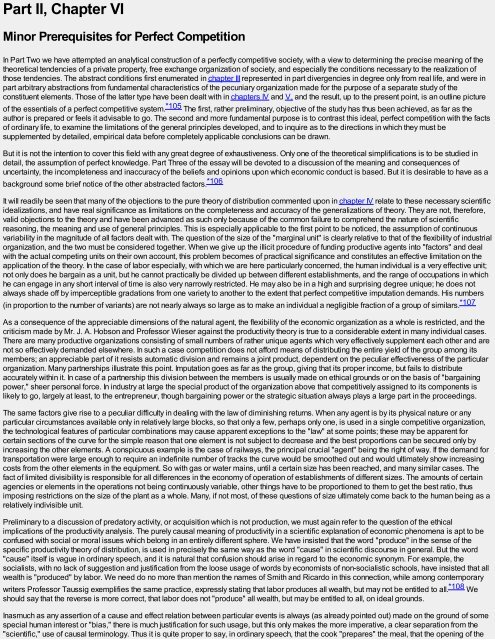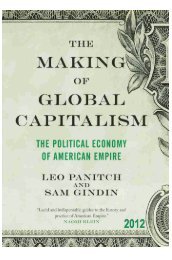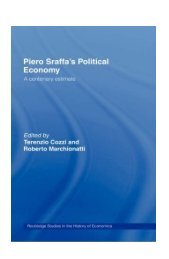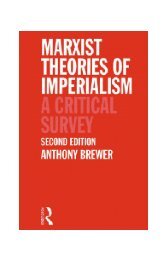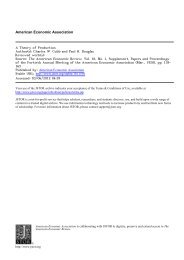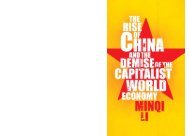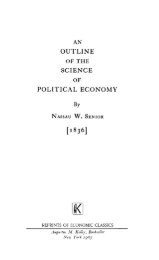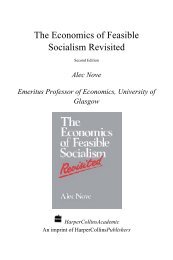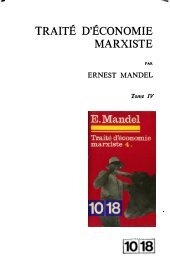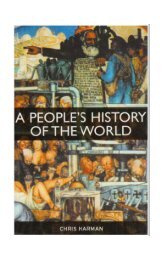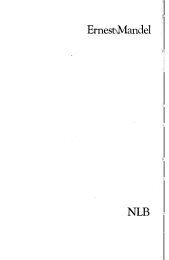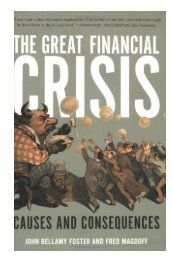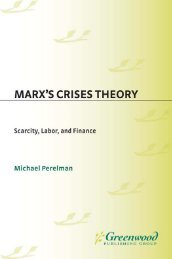Part II, Chapter VIMinor Prerequisites for Perfect CompetitionIn Part Two we have attempted an analytical construction of a perfectly competitive society, with a view to determining the precise meaning of thetheoretical tendencies of a private property, free exchange organization of society, <strong>and</strong> especially the conditions necessary to the realization ofthose tendencies. The abstract conditions first enumerated in chapter III represented in part divergencies in degree only from real life, <strong>and</strong> were inpart arbitrary abstractions from fundamental characteristics of the pecuniary organization made for the purpose of a separate study of theconstituent elements. Those of the latter type have been dealt with in chapters IV <strong>and</strong> V, <strong>and</strong> the result, up to the present point, is an outline pictureof the essentials of a perfect competitive system. *105 The first, rather preliminary, objective of the study has thus been achieved, as far as theauthor is prepared or feels it advisable to go. The second <strong>and</strong> more fundamental purpose is to contrast this ideal, perfect competition with the factsof ordinary life, to examine the limitations of the general principles developed, <strong>and</strong> to inquire as to the directions in which they must besupplemented by detailed, empirical data before completely applicable conclusions can be drawn.But it is not the intention to cover this field with any great degree of exhaustiveness. Only one of the theoretical simplifications is to be studied indetail, the assumption of perfect knowledge. Part Three of the essay will be devoted to a discussion of the meaning <strong>and</strong> consequences ofuncertainty, the incompleteness <strong>and</strong> inaccuracy of the beliefs <strong>and</strong> opinions upon which economic conduct is based. But it is desirable to have as abackground some brief notice of the other abstracted factors. *106It will readily be seen that many of the objections to the pure theory of distribution commented upon in chapter IV relate to these necessary scientificidealizations, <strong>and</strong> have real significance as limitations on the completeness <strong>and</strong> accuracy of the generalizations of theory. They are not, therefore,valid objections to the theory <strong>and</strong> have been advanced as such only because of the common failure to comprehend the nature of scientificreasoning, the meaning <strong>and</strong> use of general principles. This is especially applicable to the first point to be noticed, the assumption of continuousvariability in the magnitude of all factors dealt with. The question of the size of the "marginal unit" is clearly relative to that of the flexibility of industrialorganization, <strong>and</strong> the two must be considered together. When we give up the illicit procedure of funding productive agents into "factors" <strong>and</strong> dealwith the actual competing units on their own account, this problem becomes of practical significance <strong>and</strong> constitutes an effective limitation on theapplication of the theory. In the case of labor especially, with which we are here particularly concerned, the human individual is a very effective unit;not only does he bargain as a unit, but he cannot practically be divided up between different establishments, <strong>and</strong> the range of occupations in whichhe can engage in any short interval of time is also very narrowly restricted. He may also be in a high <strong>and</strong> surprising degree unique; he does notalways shade off by imperceptible gradations from one variety to another to the extent that perfect competitive imputation dem<strong>and</strong>s. His numbers(in proportion to the number of variants) are not nearly always so large as to make an individual a negligible fraction of a group of similars. *107As a consequence of the appreciable dimensions of the natural agent, the flexibility of the economic organization as a whole is restricted, <strong>and</strong> thecriticism made by Mr. J. A. Hobson <strong>and</strong> Professor Wieser against the productivity theory is true to a considerable extent in many individual cases.There are many productive organizations consisting of small numbers of rather unique agents which very effectively supplement each other <strong>and</strong> arenot so effectively dem<strong>and</strong>ed elsewhere. In such a case competition does not afford means of distributing the entire yield of the group among itsmembers; an appreciable part of it resists automatic division <strong>and</strong> remains a joint product, dependent on the peculiar effectiveness of the particularorganization. Many partnerships illustrate this point. Imputation goes as far as the group, giving that its proper income, but fails to distributeaccurately within it. In case of a partnership this division between the members is usually made on ethical grounds or on the basis of "bargainingpower," sheer personal force. In industry at large the special product of the organization above that competitively assigned to its components islikely to go, largely at least, to the entrepreneur, though bargaining power or the strategic situation always plays a large part in the proceedings.The same factors give rise to a peculiar difficulty in dealing with the law of diminishing returns. When any agent is by its physical nature or anyparticular circumstances available only in relatively large blocks, so that only a few, perhaps only one, is used in a single competitive organization,the technological features of particular combinations may cause apparent exceptions to the "law" at some points; these may be apparent forcertain sections of the curve for the simple reason that one element is not subject to decrease <strong>and</strong> the best proportions can be secured only byincreasing the other elements. A conspicuous example is the case of railways, the principal crucial "agent" being the right of way. If the dem<strong>and</strong> fortransportation were large enough to require an indefinite number of tracks the curve would be smoothed out <strong>and</strong> would ultimately show increasingcosts from the other elements in the equipment. So with gas or water mains, until a certain size has been reached, <strong>and</strong> many similar cases. Thefact of limited divisibility is responsible for all differences in the economy of operation of establishments of different sizes. The amounts of certainagencies or elements in the operations not being continuously variable, other things have to be proportioned to them to get the best ratio, thusimposing restrictions on the size of the plant as a whole. Many, if not most, of these questions of size ultimately come back to the human being as arelatively indivisible unit.Preliminary to a discussion of predatory activity, or acquisition which is not production, we must again refer to the question of the ethicalimplications of the productivity analysis. The purely causal meaning of productivity in a scientific explanation of economic phenomena is apt to beconfused with social or moral issues which belong in an entirely different sphere. We have insisted that the word "produce" in the sense of thespecific productivity theory of distribution, is used in precisely the same way as the word "cause" in scientific discourse in general. But the word"cause" itself is vague in ordinary speech, <strong>and</strong> it is natural that confusion should arise in regard to the economic synonym. For example, thesocialists, with no lack of suggestion <strong>and</strong> justification from the loose usage of words by economists of non-socialistic schools, have insisted that allwealth is "produced" by labor. We need do no more than mention the names of Smith <strong>and</strong> Ricardo in this connection, while among contemporarywriters Professor Taussig exemplifies the same practice, expressly stating that labor produces all wealth, but may not be entitled to all. *108 Weshould say that the reverse is more correct, that labor does not "produce" all wealth, but may be entitled to all, on ideal grounds.Inasmuch as any assertion of a cause <strong>and</strong> effect relation between particular events is always (as already pointed out) made on the ground of somespecial human interest or "bias," there is much justification for such usage, but this only makes the more imperative, a clear separation from the"scientific," use of causal terminology. Thus it is quite proper to say, in ordinary speech, that the cook "prepares" the meal, that the opening of the
throttle of the locomotive by the engineer is the "cause" of the starting of the train, <strong>and</strong> that his failure to see the signal is the "cause" of the wreck<strong>and</strong> the deaths of the passengers. In an analogous way a small group of agents might for some purposes be credited with nearly the whole outputof a large establishment; "other things equal," the product depends on their coöperation.But it must be evident that scientific economics cannot use the word "produce" in this sense. The product of any productive service can for scientificpurposes be only what we have defined it to be, that which is really dependent upon the service in question, that which can be produced by its aid<strong>and</strong> which cannot be produced without it, in the social situation as it is, allowing for the change in organization which would accompany itswithdrawal from use. It follows that we cannot properly speak of the "product" of an economic "factor," even if we use the word "factor" in thepossibly legitimate sense of a group of physically interchangeable things. The product of "labor," "l<strong>and</strong>," or "capital," as aggregates, involves a stillmore illicit <strong>and</strong> meaningless use of terms. The only specific product which can be recognized is that of a single agent as such, an individual humanbeing or machine, or such a parcel of l<strong>and</strong> (or of liquid capital) as is actually bargained for <strong>and</strong> used in the production process (<strong>and</strong> for perfectcompetition to take place it must be negligible in size).More important, however, is the error of attributing any sort of moral significance to economic productivity. It is a physical, mechanical attribute,attaching to inanimate objects quite as properly as to persons, <strong>and</strong> to non-moral or even immoral as well as virtuous activities of the latter. Theconfusion of causality with desert is an inexcusable blunder for which the bourgeois psychology of modern society is perhaps ultimately to blame,though productivity theorists are not guiltless. *109 We must guard against thinking of the "natural" adjustment of the competitive system as havingany moral import, though it is of course "ideal" in the scientific sense of being a condition of stability. To call it the "best possible" arrangement ismerely to beg the question or to misuse words. The natural arrangement is only that under which, with the given conditions as to the dem<strong>and</strong> <strong>and</strong>supply of goods, especially the existing distribution of productive power, no one is under any inducement to make any change. If we pass over thequestion of how far individual wants for specific things really dominate conduct, <strong>and</strong> neglect equally the whole category of wants for certain socialrelationships <strong>and</strong> interests in other individuals (not absolutely dependent), <strong>and</strong> assume in addition (we shall investigate the point presently) that nointerests are involved in any exchange except those of the direct parties to it—then the result is a mere mechanical equilibrium of the pull <strong>and</strong> haulof interacting individual self-interests.It is imperative that we bear in mind that the serpent's tail is always in the serpent's mouth, that what the competitive system tends to give back isjust what is put into it in the way of human motives <strong>and</strong> human powers, natural, acquired, or conferred, <strong>and</strong> has in itself no moral attribute whatever.In real life the possession of property (or superior training) is supposed to represent saving or invention or some contribution to social progress. Butit is clear that there is no technical (much less moral) equivalence between these services <strong>and</strong> the right to their entire fruits in perpetuity, <strong>and</strong> toconfer it on one's heirs <strong>and</strong> assigns forever—particularly when we consider the enormous element of pure luck in all operations of this sort. The onlysense <strong>and</strong> the only degree in which rewards for service are ethical is that of the necessity of paying the reward in order to get the serviceperformed. From this point of view the only defense of most of the existing system is the difficulty of suggesting a workable alternative.We must now turn again briefly to the point mentioned above, the extent to which outside interests not represented in agreements betweenindividuals are affected by them (otherwise than through direct competition in the market). The mere mechanical effectiveness of competitive freecontract in producing a reconciliation of individual interests under given conditions depends largely on the answer to this question. Obviously,outsiders may be affected either advantageously or disadvantageously. In the former case voluntary agreements will not be carried far enough tosecure maximum social (total individual) advantage, while in the latter case they will be carried too far. These facts form the most important sourceof the need for social interference. Many services, such as communication <strong>and</strong> education, not to mention the administration of justice, confer ageneral benefit on the community in addition to the special benefit to the individual, <strong>and</strong> must be encouraged by bounties or actually taken over <strong>and</strong>performed by public agencies or they will not be developed to the point of maximum benefit. The most familiar illustrations of the opposite case inour society relate to the use of l<strong>and</strong> for purposes which damage the neighborhood, or are thought to do so. It is perhaps of nearly equal importancethat improvements on l<strong>and</strong> <strong>and</strong> industrial developments generally may benefit neighboring property, <strong>and</strong> might be made much more readily <strong>and</strong> inways involving less injustice if there were some practicable way of assessing these benefits. This is notably true of public <strong>and</strong> quasi-public works,which effect enormous uncompensated transfers of values. It may be doubted whether in fact any agreement between individuals is ever madewhich does not affect for good or ill many persons other than the immediate parties, <strong>and</strong> a large proportion have wide ramifications over "society."In this brief sketch we can only mention <strong>and</strong> insist on the fundamental importance of the fact that a large part of what men want relates directly toother members of society. Man is, after all, zoön politikon <strong>and</strong> quite on a par with his personal needs are all sorts of interests in furthering the plansof people whom he likes <strong>and</strong>, always relatively <strong>and</strong> generally absolutely, obstructing those of others, in a wide scale of gradations down toThackeray's " 'e's a furriner; 'eave a 'arf a brick at 'im!" or, "kill the nigger!" The relative importance of other-regarding motives <strong>and</strong> desires, directednot to material things, but to forms of social relationships, is sure to be underestimated by any one treating economic phenomena in a "scientific"way.The extreme phase of the problem of the moral character of the economic system relates to positively predatory activity. Davenport, followingVeblen, has stressed the contrast between (private) acquisition <strong>and</strong> (social) production, making much of the hiring of sluggers, assassins, <strong>and</strong>incendiaries as part of the dem<strong>and</strong> for labor, the productivity of burglars <strong>and</strong> their implements, <strong>and</strong> the like. It is not really very difficult in most casesfor one who is disposed to do so to distinguish between theft or brig<strong>and</strong>age <strong>and</strong> free contract, <strong>and</strong> perhaps all that is needful to say of them intreating the theory of contractual organization is that they are obviously outside of it. A large part of the critics' strictures on the existing systemcome down to protests against the individual wanting what he wants instead of what is good for him, of which the critic is to be the judge; <strong>and</strong> thecritic does not feel himself called upon even to outline any st<strong>and</strong>ards other than his own preferences upon a basis of which judgment is to bepassed. It would be well for the progress of science if we had less of this sort of thing <strong>and</strong> more serious effort to formulate st<strong>and</strong>ards <strong>and</strong> todetermine the conditions under which free contract does or does not promote individual interests harmoniously <strong>and</strong> realize social ideals. In additionit is most desirable that some attempt be made to separate the evils for which the form of organization is more or less reasonably blamable fromthose which are inherent in nature <strong>and</strong> human nature, or in organization as such, irrespective of its form, <strong>and</strong> to keep the question in view, incriticizing the exchange system, of whether any other conceivable system would offer any possible chance for change or improvement. *110There is a close connection between the moral aspect of the economic order <strong>and</strong> the problem of monopoly. This subject is of especial importancein the theory of profit, since profit has often been ascribed wholly or in part to monopoly gain, as already noticed in the case of Macvane <strong>and</strong> the
- Page 2 and 3: Go To Chapter 1Author's PrefaceTher
- Page 4 and 5: possible. It is the scientific meth
- Page 6 and 7: drawn-out redistribution of energy
- Page 8 and 9: left after (a) interest, (b) insura
- Page 10 and 11: The fatal criticism of this procedu
- Page 12 and 13: sides of the controversy, in assumi
- Page 14 and 15: Part II, Chapter IIIThe Theory of C
- Page 16 and 17: ecause they give rise to no conflic
- Page 18 and 19: credits are equal. There is a sort
- Page 20 and 21: either superabundant, and consequen
- Page 23 and 24: Part II, Chapter IVJoint Production
- Page 25 and 26: on his business. It is obvious that
- Page 27: word "product" in the same meaning
- Page 30 and 31: that the owner of such property may
- Page 32 and 33: consumption, to secure a rising dis
- Page 34 and 35: difference between personal ability
- Page 36 and 37: limits its increase rises at the sa
- Page 38 and 39: amounts of agencies not freely repr
- Page 42 and 43: Clark School. "Monopoly" is a word
- Page 44 and 45: incapable of wielding to his own ad
- Page 46 and 47: automata, but we are not. At least
- Page 48 and 49: The practical limitation of knowled
- Page 50 and 51: to its conclusion, it seems that th
- Page 52 and 53: should regard the probability for h
- Page 54 and 55: themselves into an opinion of a pro
- Page 56 and 57: equally probable alternatives; but
- Page 58 and 59: It is particularly noteworthy that
- Page 60 and 61: Part III, Chapter IXEnterprise and
- Page 62 and 63: ecommenced at the beginning.We turn
- Page 64 and 65: number of times. The allowance for
- Page 66 and 67: Part III, Chapter XEnterprise and P
- Page 68 and 69: esources are placed in an exposed p
- Page 70 and 71: Pure profit is theoretically unimpu
- Page 72 and 73: This distinction is also well recog
- Page 74 and 75: call for the exercise of judgment i
- Page 76 and 77: The uncertainty so far discussed in
- Page 78 and 79: others. It will ordinarily be true
- Page 80 and 81: e a brief examination into the mean
- Page 82 and 83: And this even though the same men k
- Page 84 and 85: economic conduct, and weighed again
- Page 93 and 94:
Frank H. Knight, Risk, Uncertainty,
- Page 95 and 96:
18. These national designations of
- Page 97 and 98:
dynamic economic changes are of thi
- Page 99 and 100:
2. This is intended as a statement
- Page 101 and 102:
of æsthetics (another form of "val
- Page 103 and 104:
Economics, vol. XVI, pp. 473 ff.) B
- Page 105 and 106:
57. See chapter VI.58. We may notic
- Page 107 and 108:
Economy, pp. 72 ff., where the same
- Page 109 and 110:
War, in particular, has wrought cha
- Page 111 and 112:
105. There is one important excepti
- Page 113 and 114:
time tendencies or with "static" ec
- Page 115 and 116:
24. Chapter V, the reader will reca
- Page 117 and 118:
virtue" of opiates. The latter at l
- Page 119:
68. Principles of Economics (1913),


